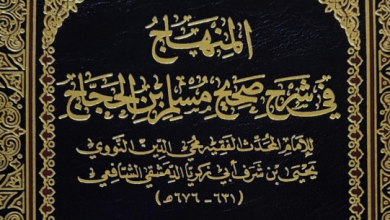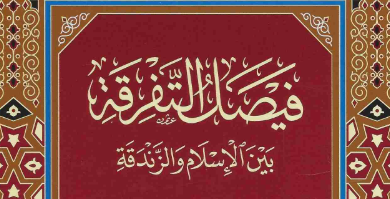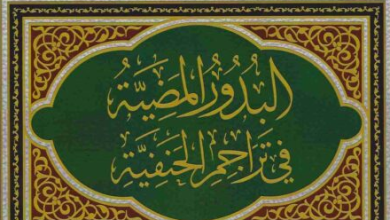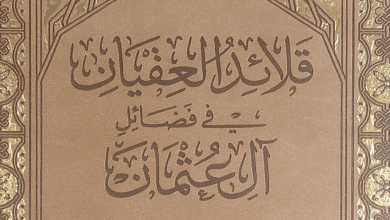Laymen asking Scholars for Proof
Introduction
The religion of Islām has been made easy in terms of it’s practicality, we find this is true due to the fact that the relinquishing of its duties is within our capabilities whilst still getting along with our daily chores whether they are work, study, running a family and then still finding time to socialise (online and offline). This is because Allāh has mentioned that He doesn’t burden our souls with more than they can bear (al-Qur’ān, 2:185). Among the many blessings that Allāh has given us (the common-folk) is to have trust in our Scholars of Dīn, to rely upon them without having to go deep into the sources (ourselves), extracting rulings of fiqh (peripheral issues) and then having to act upon them. However, by His grace we are not told to look at the proof which the Scholars utilise, rather to only ask the people of knowledge when the need arises and accept it (al-Qur’ān, 21:7).
This is something which has been accepted by the ummah and its scholars for over a millennium and such can be easily gleaned from a look into the books of Tabaqāt and Tārīkh. Those who deny this fact are nothing more than deluded revisionists of history who distort our heritage in order to make it fit their absurd claims. As many who are reading this will know, a recent sect, which popped up not too long ago, actually advocates that the layperson (those who have no deep learning of the Islamic sciences) should follow the ‘stronger’ proofs and not to ‘blindly follow’ any Scholar. Not only is this a flawed concept in and of itself, but such a concept will inevitably overburden the general masses (to do that which is beyond their capabilities). It is also something that Allāh did not command them (the common-folk) to do.
Most intriguing is the fact that this opinion takes root in a historical sect known as the Muʿtazilah, a heretical sect, which was then mimicked by the Qadariyyah in regards to it. The following compilation of quotes proves beyond doubt that such an opinion is in actual fact a revival of the methodology of the Mu‘tazilites and Qadirites.
The irony of all of this is that this recently mushroomed sect is against any sort of innovation in religion, yet they are guilty of the biggest innovation, which is forcing the laity to delve into the sources of the religion to do DIY Ijtihād. To add insult to injury, this defunct concept is not from the Scholars of the Ahl ‘l-Sunnah, but rather a heretical sect which has now died out.
Relevant quotes reflecting today’s Salafīs
In al-Iḥkām fī Usūl al-Aḥkām of Imām Sayf al-Dīn al-Āmidī (d.631 AH), he says regarding Taqlīd (4/229):
“The laity are not from those that have the quality of ijtihād, even if they were to acquaint themselves with some decent knowledge of the sciences related to ijtihād, it is (still) mandatory upon them to follow the Mujtahidīn and take their fatāwā, (this being) in accordance with the verifiers from the Usūliyyīn. (However) Some of the Muʾtazilites of Baghdād prohibited this and said: ‘(even) that is not permitted (ie. taking of the fatwā of the Muftī by the layperson) unless he distinguishes the authenticity of his (Muftī’s) ijtihād with proof’. It is related from al-Jubbā’ī that he permitted that in matters of ijtihād with the exception of a few things like praying of the five (obligatory prayers). The correct view is that of the first school (that it is mandatory for the laymen to take the fatwā of their Muftī without knowing the proof), and upon this is clear proof, Ijmāʾ and common sense”.
Another Scholar that can be added is Abū Bakr Aḥmad al-Khatīb al-Baghdādī (d.463 AH), he mentions in his book al-Faqīh wa ‘l-Mutafaqqih (2/133):
“It is related that some of the Muʾtazilites said: ‘It is not permitted for a layman to act upon the fatwa of an ʿĀlim until he knows the reason behind such ruling (ie. proof). So when he (does) ask the ʿĀlim he should ask him so he (himself) comes to understand the ruling (ie. knowing the proof himself). After he does understand it he should apply it (ie. the ruling)’. (Al-Khatīb then says:) This is wrong! There is absolutely no way for the layman to do that, except after studying many years, mixing with the fuqahā’ for long periods of time and (then) understand the intricacies of analogical reasoning”.
Another great Scholar to add to the list is Imām Abū Ḥāmid al-Ghazālī (d.505 AH), he mentions in al-Mustaṣfā fī ʿIlm ‘l-Usūl (pg.373):
“It is obligatory upon the layman to seek religious edicts (fatāwā) and follow the Scholars, while a group from the Qadarites[1] said: ‘It is obligatory upon the laity to seek the proof and follow Rasūlullāh صلى الله عليه وسلم.’ (Al-Ghazzālī then says) ‘This (view of the Qadarites) is bāṭil in two ways, one is; the consensus (Ijmāʾ) of the Companions رضي الله عنهم, for they used to issue rulings to the laity (ʿawām), and they did not command them to attain the level of Ijtihād… The second (reason why it is bāṭil) is; that the consensus is upheld that the layperson will be overwhelmed with the religious rulings. His overburdening to attain the level of Ijtihād would be absurd because it will lead to the abandonment of work and future posterity, it will damage trading and craftsmanship which will then lead to the destruction of our world”.
[1] The Qadarites are a distinct sect from the Muʾtazilites.
Imām Muwaffaq al-Dīn Ibn Qudāmah al-Maqdisī (d.620 AH), the erudite Ḥanbalī Scholar also echoes the exact sentiments mentioned by al-Ghazālī, in his Rawdhat al-Nāẓir wa Jannat al-Manāẓir (1/383):
“As for taqlīd in peripheral issues (furūʿ) then it is permitted according to the scholarly consensus, for there is proof in the scholarly consensus. This is because whether the Mujtahid is correct (in his religious edicts) or whether he errs, (regardless) is rewarded without sin… while a group from the Qadarites said: ‘It is obligatory upon the laity to seek the proof for peripheral issues (furūʿ) also’, (Ibn Qudāmah then says) and it (this opinion of the Qadarites) is bāṭil (null) according to the consensus (Ijmāʾ) of the Companions رضي الله عنهم, for they used to issue rulings to the laity (ʿawām), and they did not command them to attain the level of Ijtihād as that is known in our religion by necessity and what was multiply narrated from their scholars and their laity, because the consensus is upheld that the layperson will be overwhelmed with the religious rulings. His overburdening to attain the level of Ijtihād would be absurd because it will lead to the abandonment of work and future posterity, it will damage trading and craftsmanship which will then lead to the destruction of our world”.
Another Ḥanbalī Scholar to add is Imām Muḥammad al-Saffārīnī (d.1188 AH), who mentions in his Lawāmiʾ al-Anwār al-Bahiyyah (2/465):
“Imām Ibn Qudāmah mentioned in Rawdhah: ‘As for taqlīd in peripheral issues (furūʿ) then it is permitted according to the scholarly consensus (ijmāʿ)’. He also said: ‘Some of the Qadarites are of the view that it is obligatory upon the laity to look at the proof’. (al-Saffārīnī says) The proof that bases the permissibility of taqlīd is taken from the following verse: ‘Ask the people of knowledge if you do not know’… also there is consensus that the laity do taqlīd of the Scholars without (their scholars) providing proof and without being rebuked. Without this opinion (the permissibility of taqlīd) it will lead to the downfall of our worldly life, the abandonment of livelihood and trade… Imām Mālik said: ‘Taqlīd is obligatory upon the laity of the Mujtahidīn in the Aḥkām just as it is obligatory upon the Mujtahidīn to do Ijtihād with suitable proofs’. (al-Saffārīnī says) the Muʾtazilites of Baghdād were against this for they agreed with the Qadarites that the laymen are obliged to do Ijtihād (also)”.
The above quotes have made it abundantly clear that the common-folk do not look at the proofs of their Scholars in fiqh, nor do they weigh the opinions according to the strength of the proof, and upon this – as clearly mentioned – is ijmā‘, even if they may have some decent amount of knowledge (as mentioned by the Uṣūlī Scholar, al-Āmidī). It is also proven that such an opinion originates from none other than the heretcial sects; the Mu‘tazilah and their off-shoot sect, the Qadariyyah. Although a fringe minority did hold such an opinion from amongst the Ẓāhirī Scholars, however this was was not recieved well by the Scholars of the Ahl ‘l-Sunnah hence they have written refutations of it as can be clearly understood from above. The reason for this is that the laypeople cannot be given authority over nusūs (religious texts) and dīnī affairs, just like they cannot be given authority in dunyawī affairs if they do not have knowledge in that particular field, like for example diagnosing illnesses, prescribing medicine, or even operating at the theatre; all of which requires vast knowledge in the subject area, certification and even experience.
Unfortunately this view has gained popularity among the contemporary Salafī sect. From their leaders, Sh. Nāṣir al-Dīn al-Albānī advocates this view in his book al-Ḥadīth Ḥujjah bi-Nafsih (1/81), first he quotes Ḥāfiẓ Ibn ‘Abd al-Barr:
“There is no disagreement amongst the Scholars regarding the obligation upon the common folk to do taqlīd. For they are the ones that are being referred to in the following verse, ‘And ask the people of knowledge if you do not know.’ Scholars also have agreed that the blind must do taqlīd of others, from those who he trusts if he wants to know the direction of the Qiblah when he finds it difficult upon himself to find it. Similarly, one who has no knowledge and insight of what the understanding is regarding what is in front of him, will have to do taqlīd of his scholar. Also, there is no disagreements amongst the Scholars that it is not permitted for the laity to issue religious edicts and that is because – and Allāh knows best – the laity are ignorant of the meanings (meaning they do not undersand it) from that which is permitted and not permitted.”
Before al-Albānī’s view is given, it is imperative to know – from the above – the views Ibn ‘Abd al-Barr in a nutshell:
1. Taqlīd is an obligation upon the common-folk.
2. The common-folk do not understand the detailed proofs.
Sh. al-Albānī then makes a distinction:
(Translation available online)
“However, I (al-Albānī) believe that to generalize about commoners, saying that they all must perform Taqleed, is invalid. Taqleed is following sayings of others without evidence to prove these sayings. Many smart commoners can clearly understand evidence if it is presented to them. Who can deny that a commoner can understand the evidence contained in the Hadeeth, ‘Tayammum (performing dry ablution with sand when water is scarce) is one strike (on the sand) for the face and hands!’ Even those people, who are of minor comprehension, can understand this Hadeeth. Therefore, the truth is that we must say that Taqleed is allowed for whoever cannot search for or understand the evidence”.
Due to the above tacit approval of their leader it has given way to the illiterates in this sect to always want to look at proofs and weigh up their strengths. This is known as the ‘rājiḥ qawl’ fitnah that is in vogue. Truth be told many from this sect are oblivious with regards to how to recite the Qur’ān properly with its Aḥkām, let alone trying to understand complex issues.
Ultimately, this much is clear, they are modern day revivers of this Mu‘tazilī methodology.
—————
Compiled by Abu Humayd







As salam alaikum Shaykh,
I was listening to tafseer and the scholar said 15 must read books in Islam in which he mentioned Ilhya uloom ud deen of Imam gazali and Muqadama of Ibn Khuldoon. Can you let me know the complete list which scholars advice to read.
Thanking you,
Amj
The irony is that they blindly follow Albani more strictly than we follow the mujtahid imams. To the extent that many will break friendships with anyone who dares to say anything against his teachings.